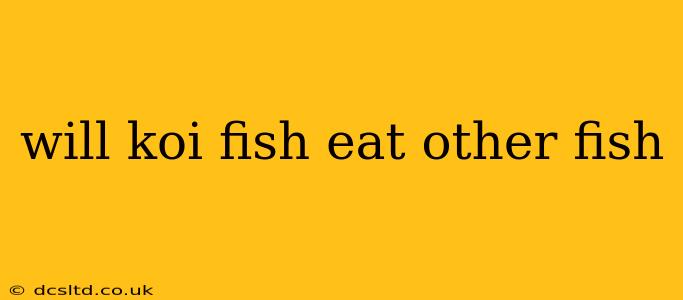Koi, with their vibrant colors and graceful movements, are beloved additions to many water gardens. But a common question among prospective and current koi keepers is: will koi eat other fish? The answer, unfortunately, isn't a simple yes or no. It depends on several factors, including the size of the koi, the size and species of the other fish, and the overall environment of the pond.
Let's delve deeper into this question and explore the nuances of koi's dietary habits.
What Do Koi Fish Eat?
Before addressing the question of predation, it's crucial to understand a koi's natural diet. Koi are omnivores, meaning they consume both plants and animals. Their diet typically includes:
- Commercial Koi Food: This is a staple for most koi keepers, formulated to provide the necessary nutrients for healthy growth.
- Plants: Koi will readily consume aquatic plants, algae, and even some terrestrial plants that fall into the water.
- Insects: They'll happily snack on insects and their larvae found in the pond.
- Worms and other invertebrates: These are a natural part of their diet in the wild.
Will Koi Eat Smaller Fish?
This is where the complexity arises. Generally, larger koi are more likely to eat smaller fish. Think of it like this: a large koi, particularly an adult, has a much larger mouth and a greater need for calories to sustain its size. Smaller fish, especially those that are slow-moving or easily caught, can become easy prey.
However, a smaller koi, or one that is well-fed with a proper diet, is less likely to actively hunt other fish. Their energy is focused on growth and maintaining their own health.
What Factors Influence Koi's Predatory Behavior?
Several factors influence whether a koi will eat other fish:
- Size and Age of the Koi: Larger, older koi are significantly more likely to prey on smaller fish.
- Size and Species of Other Fish: Small, slow-moving fish are at greater risk than larger, more agile species.
- Feeding Habits: A well-fed koi is less likely to hunt. Regular and sufficient feeding significantly reduces the chances of cannibalism or predation on other fish.
- Pond Environment: Overcrowding and lack of adequate hiding places for smaller fish can increase the risk of predation.
What Fish Are Safe to Keep with Koi?
While no fish is completely safe from a hungry koi, some are better suited to cohabitation than others. Generally, larger, more robust fish that can defend themselves are less vulnerable. Consider species that are fast-moving and have ample space to evade a koi's pursuit.
Some examples include:
- Larger goldfish: Some larger goldfish varieties might be able to survive, although not guaranteed.
- Sturdier catfish species: Certain catfish species are known for their resilience and agility.
How to Prevent Koi from Eating Other Fish?
Here are some tips to minimize the risk of your koi eating other fish:
- Provide a diverse and sufficient diet: A well-fed koi is less likely to hunt.
- Create ample hiding places: Provide plenty of rocks, plants, and structures in your pond to give smaller fish a refuge.
- Choose appropriately sized tank mates: Select fish that are unlikely to be viewed as easy prey by your koi.
- Monitor your pond regularly: Observe the interactions between your fish to identify any potential problems early on.
Will Koi Eat Their Own Young?
Yes, adult koi can potentially eat their own young (fry). This is more common in overcrowded ponds or when the parent koi are undernourished. Providing ample space and a healthy diet can reduce the likelihood of this happening.
Can Koi Eat Plants?
Yes, koi are omnivores and will readily eat many types of aquatic plants, algae, and even some terrestrial vegetation that falls into the pond. This is a natural part of their diet.
In conclusion, while the possibility of koi eating other fish exists, particularly smaller or slower species, it's not a guaranteed outcome. By understanding their dietary needs, creating a suitable environment, and selecting appropriate tank mates, you can significantly reduce the chances of predation and ensure a harmonious coexistence in your pond. Remember, responsible koi keeping involves providing a balanced ecosystem and carefully considering the needs of all its inhabitants.
